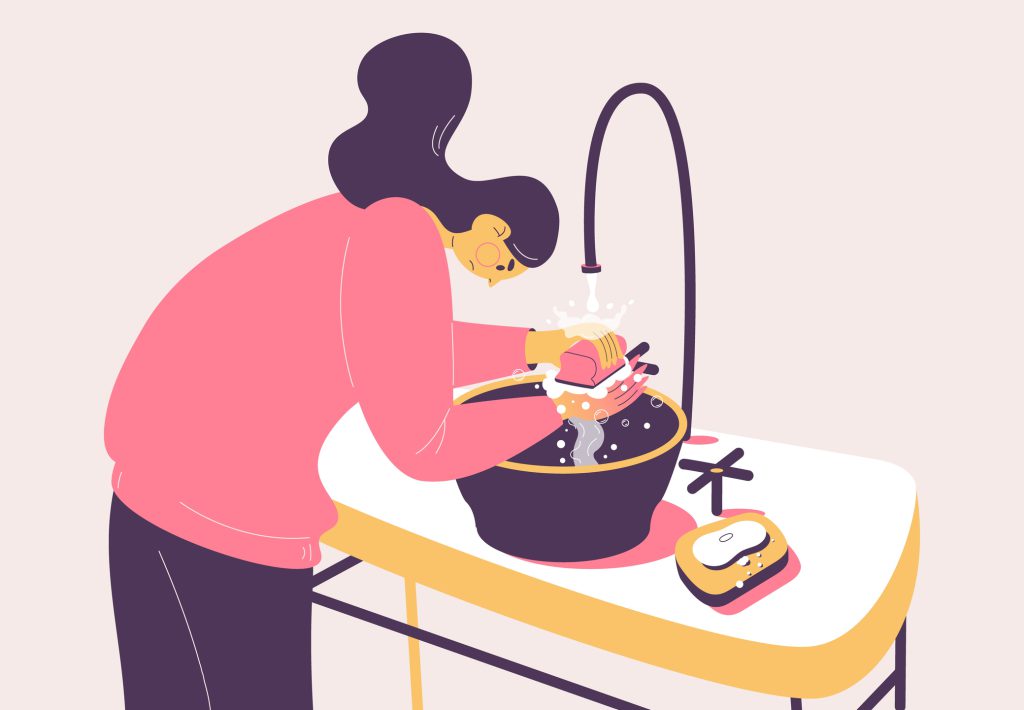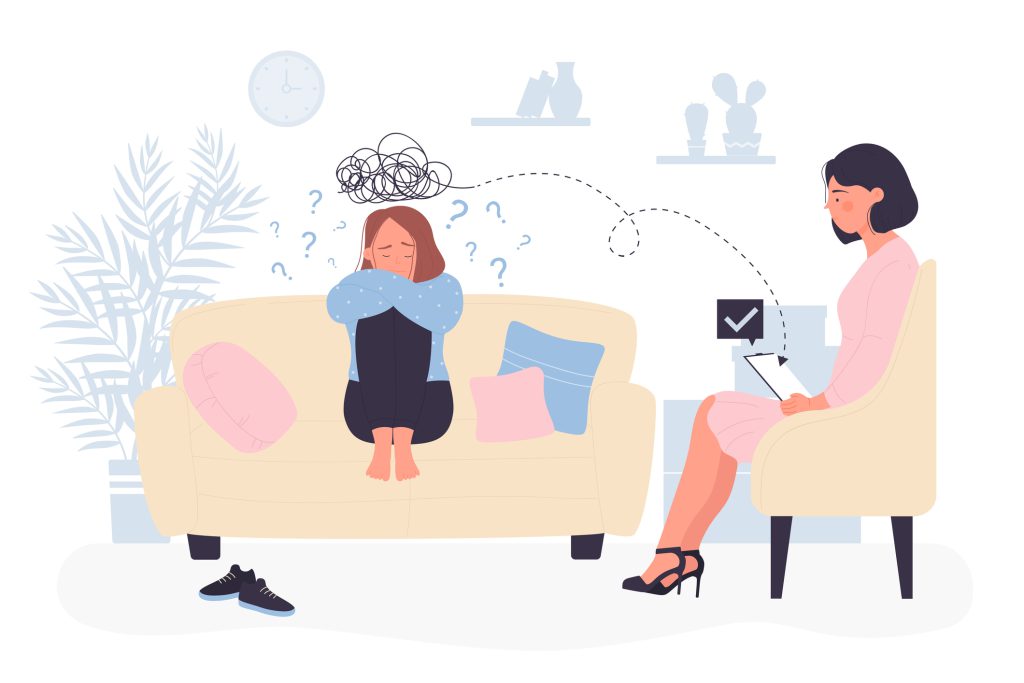Next in the ‘A-Z’ series is O for OCD. Bioresource Placement Student Hollie details her own lived experience with Obsessive Compulsive Disorder (OCD).
Introduction
My name is Hollie and I’m a final year psychology student at the University of Bath, and last year I was lucky enough to spend my placement year at the SGDP, working with the Bioresource team on the Genetic Links to Anxiety and Depression (GLAD) study and the Eating Disorders Genetics Initiative (EDGI). These are large-scale studies seeking to identify environmental and genetic contributions to mental health conditions. I was drawn to both psychology and the research placement at the IOPPN – at least in part – because of my own experiences with mental health. I was diagnosed with obsessive compulsive disorder at age 11, having just started at secondary school which, I suppose, must have been scarier than I expected! I’m writing this post to share what it can be like to live with OCD, because it is hugely misrepresented in the media, but I’d also like to highlight that OCD can present in so many different ways, and can be far more debilitating than my own experiences.
The beginning
The tricky thing about mental health is that you can’t see it (shocking, I know- but wouldn’t things be easier if we could?). Plenty of conditions can present in similar ways, and some symptoms can be brushed off as just an odd quirk or a unique personality trait. The exact nature of a problem can still be difficult to identify, even in yourself, especially considering we aren’t taught much about the mind in the same way we are about the body. And so, when at age 11 I started spending ages at the sink, scrubbing my skin into a flaky mess, using copious amounts of hand-wash and refusing to leave the bathroom, it’s safe to say my parents were pretty confused. I’d always done as I was told, and my sudden reluctance to get out of the shower and stop wasting so much water was out of character. Eventually it got to the point where I was spending so long on my various hygiene rituals that I couldn’t get to school on time and ended up not going in for a while… leaving all day for my rituals to develop.
Getting help
I like to imagine that the first part of my poor mum’s conversation with the GP went something along the lines of “What on earth is wrong with my child?” and to be honest, I think he was as confused as she was. He told her not to do anything to distress or upset me – i.e. allow me to perform my rituals to my heart’s content (retrospectively, perhaps not the most effective technique) – and referred me to CAMHS (Child and Adolescent Mental Health Services). The psychologist at CAMHS diagnosed me with OCD fairly quickly and explained the treatment: cognitive behavioural therapy, or CBT.
By this point, I was walking around the house with my hands held up like a meerkat to avoid touching anything and risking contamination, lest I need to go back to the bathroom and start the exhausting handwashing process again. I had some sort of morality/lying obsession, and I remember scattering “I think” or “I’m not sure though” throughout my speech to make sure I didn’t tell someone something wrong. I spent a few weeks off school because it had been impossible for me to get in on time, and the friend I had always walked to school with was becoming quite concerned when she knocked on the door every day for my mum to tell her I was still “poorly” and not going in today. I was spending literally hours in the bathroom; my mum took time off work to look after me, but there was little she could do. OCD was controlling my entire life. I barely left the house, I couldn’t touch anything because I was terrified of contamination, I couldn’t touch my pet mouse (yes, for fear of contaminating the mouse), and I was living in constant anxiety. It wasn’t a fun time, but I’m lucky enough to have wonderful parents who pulled me out.
Therapy
The therapist I met with explained OCD to my parents and me. She described it as an alarm bell ringing when it isn’t supposed to. She asked me to explain what exactly I was worried about. Why did it matter if my hands were dirty? What was going to happen? Although some people with OCD are fearful of specific consequences if they fail to perform their rituals, mine was more of a feeling. I didn’t like these questions, I just had to feel clean enough, and certainly did not want to feel contaminated.
To be honest, I hated my therapist. Looking back, she was probably quite skilled – encouraging my parents to engage with my exposure-response therapy – but the 11-year-old in the chair only saw a woman trying to make her as anxious as humanly possible. My parents weren’t particularly keen on the idea of putting me on medication at such a young age – I don’t imagine many would be – but after a few sessions it became apparent that I was too anxious to engage with therapy, so I started taking a small dose of Sertraline.
These little tablets that I started taking with my breakfast seemed like magic. It was bizarre: all of a sudden, I could touch the new book that my aunt had sent me. It had been sitting, untouched, on the mantelpiece for days, but I was so worried about contaminating it that I decided it was best to leave it as an ornament. Now, I’ve learned that it takes at least a couple of weeks for SSRIs to kick in chemically, but I must’ve been so desperate for a solution that the placebo effect made me feel a little better in a couple of days. I began to engage with the therapy a little more, and perhaps even hate the therapist a little less.
My CBT sessions included writing lists of anxiety-inducing situations and rating them. I had to practise experiencing things that caused me lower amounts of anxiety (perhaps touching the tap) and then live with the anxiety and delay the compulsion (hand washing) and observe the anxiety decreasing over time. Gradually I progressed to situations that would cause more intense anxiety. I also had to try delaying the compulsions and had to tally things like how many pumps of soap or how many times I washed my hands, and progressively bring them down. Although the Sertraline helped keep my anxiety at a more manageable level, going against every instinct I had by contaminating myself was very distressing. I had my parents to help me; my dad tried hard to distract me from the obsessions whilst I delayed the compulsions. His approach tends to be that distraction is the best policy, and he was right… but I don’t think I thought so at the time.
They were trying their very best to encourage me to go back into school, but I was terrified. School toilets are not a pleasant experience for anyone, let alone me, and every surface at school seemed like a prime location for contamination. If I touched something dirty, I’d have to wash my hands. But that meant going into the school loos and touching the dirty taps! Sometimes I’d psych myself up enough to walk to school with Dad but would end up coming back with him because I couldn’t do it. But as my therapy progressed and my dosage increased, I was able to go into school more and more, to go back to walking in with my friend rather than my parents, and even eventually to go into the school bathrooms. I remember telling a friend at school that I had OCD, and the girl in front of me turned around, looked down her nose at me, and said “You can’t have OCD, your desk is way too messy”. This is a great example of the misinformation circulating about the condition.
Now, I’m in my 4th year at university and I’m 21, and I’ve been on Sertraline on-and-off for nearly 10 years now. Thankfully, my OCD is currently well managed, but there have been a few blips over the years, when I’ve adjusted my dosage, and tried CBT again a few times. I think the main point I want to get across is that OCD is a real condition, and real people are affected by it. It isn’t just a TV show character who likes to line their pencils up, and you aren’t “so OCD” because you like to keep your room tidy. My room is a tip, and I couldn’t care less what order my pencils are in… let alone how messy my desk is. But I also want to highlight that my experiences do not reflect those of everyone with OCD. My symptoms fit the stereotype quite nicely to an extent, but there are so many ways in which the condition can present, and it can be far more severe. Other themes in OCD include anxiety about harming others or obsessions about relationships: my friend with OCD had intrusive thoughts about hurting her little brother and the resulting compulsions involved avoiding him at any cost and refusing to touch a knife. If you want to learn more about the different types, OCD UK has a pretty good resource that I’ll link below, and it demonstrates how varied it can be.
Thank you so much for reading (if you got this far!), and a huge thanks to the Bioresource team for providing such a wonderful placement experience, and to the EDIT lab for giving me the opportunity to share my experiences.
Links:


